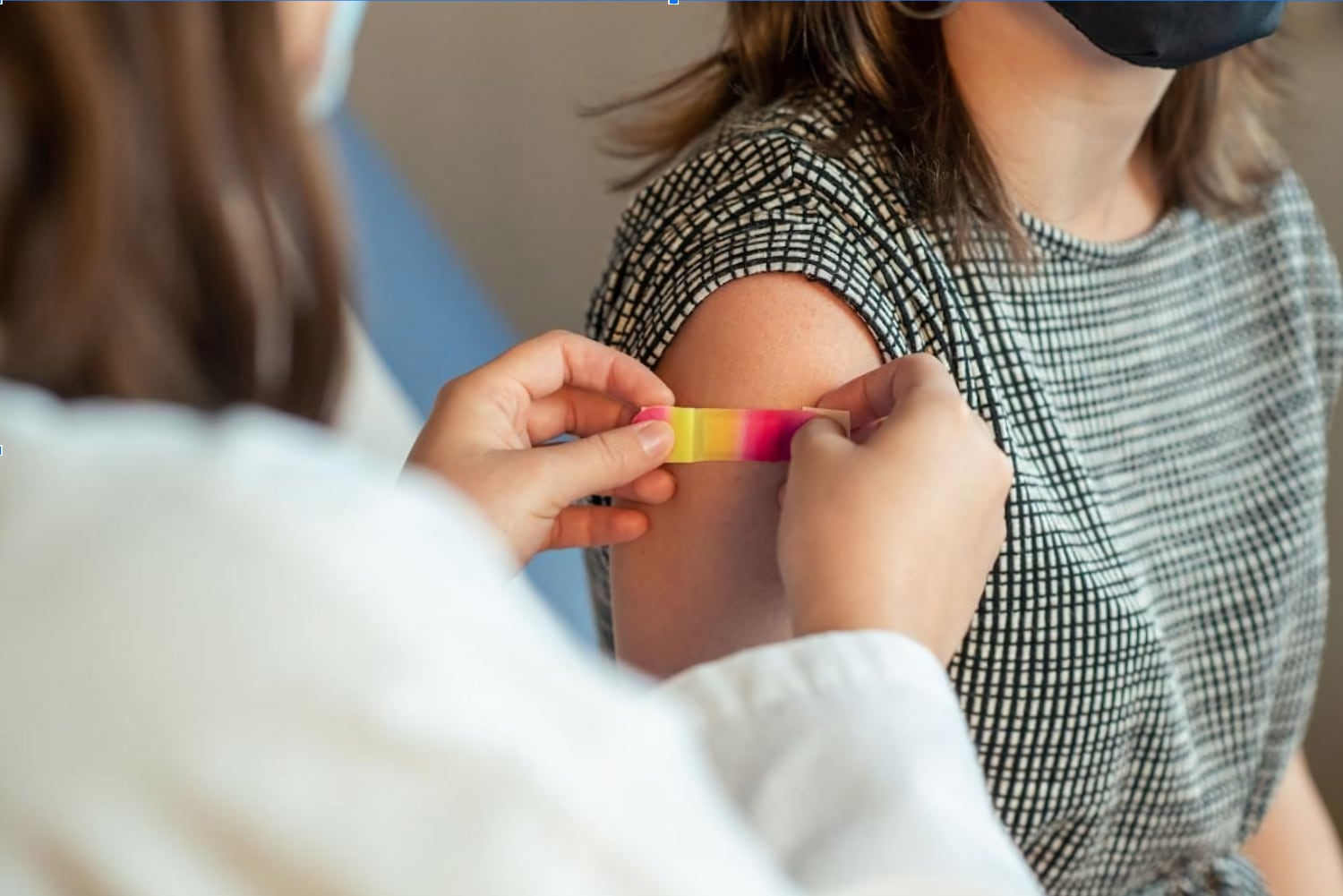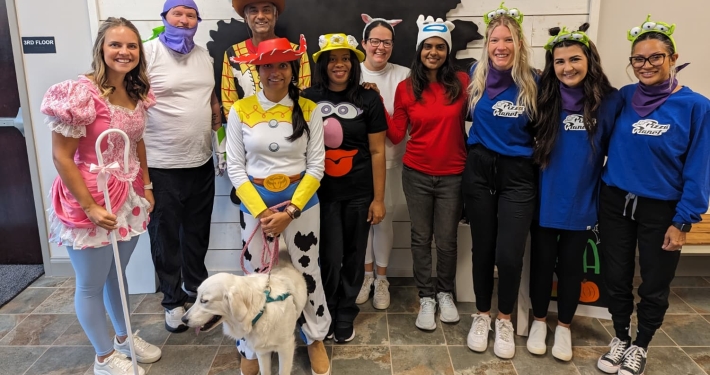Advice to My Younger Self: Independent Pediatricians Reflect on the Early Days
Despite misinformation spread by anti-vaccine activists, social media bullies, and internet trolls, Dr. Eve Switzer understood that vaccines in childhood (and beyond) are too important to overlook. So instead of backing down, she stood up for vaccines – and won.
Anti-vaxxers have existed for numerous years, and unfortunately, some groups opposed to routine vaccination use misinformation married with sensationalist and fear tactics to turn others away from treatment supported by scientific fact. Parents might choose a staggered vaccine schedule, know a parent who worries about the dangers of thimerosal in vaccines, or have a well-meaning family member who frequently cautions about the widespread but now debunked myths surrounding a vaccine-autism link.
Independently practicing pediatricians often discuss and provide pamphlets with their patients’ parents about how skipping or delaying vaccines can create issues. Unwilling listeners might respond with skepticism or even backlash when their child’s pediatrician brings up vaccinations. But what happens when the fight between anti-vaccine activists and pediatricians gets personal?
Dr. Eve Switzer, MD, FAAP, knows this fight intimately as a pediatrician who won an anti-vax court case. Despite bullying and harassment from many, she took a stand against anti-vaccine rhetoric, misinformation, and trolls and refused to back down despite a heated legal battle.
Dr. Switzer’s story is important for many reasons. It highlights the skepticism and ugliness of anti-vaccine groups and sets a precedent for standing up for personal convictions backed by science. Learn how she advocated for herself, took her harassers to the courts, and won her battle against the anti-science movement and the individuals threatening her. This decision can help set a social and legal precedent for similar cases — a monumental feat in a world drowning in misinformation.
“I kind of was leaning towards primary care, either pediatrics or internal medicine. And then once I did my pediatric rotation, it was like, ‘Oh yeah, that’s definitely what I want to do.'”Dr. Eve Switzer
A Pediatrician on a Farm
Career Beginnings
As a high schooler, Eve Switzer dreamed of becoming a doctor. Upon starting clinical rotations in medical school, she tried to keep an open mind to any specialty that drew her in. She found a passion for pediatrics immediately. However, she didn’t start practicing independently right out of school. Because her husband was stationed in the Air Force in Enid, Oklahoma, she faced limited options for work. Ultimately, she chose employment as the Air Force base pediatrician.
After working at the base, she found part-time employment at a local practice and then transitioned to full-time work as a partner at her current practice. As the years went on, other practitioners retired, and Dr. Switzer became the “last woman left standing.” She now owns the practice and has enlisted the assistance of a PA and a nurse practitioner to manage her caseload.
Personal Interests
Dr. Switzer and her family still reside in Enid, a semi-rural area with a population of about 50,000, about an hour and a half from Tulsa. She feels a deep connection with the community she’s served for over 25 years.
She enjoys having outlets for stress in the form of several hobbies. She plays violin in a local symphony, runs, and spends the rest of her free time with her husband and two adult children.
“I have always been very pro-vaccine, and it really wasn’t until I was in practice for maybe half a dozen years or so that I ran into my first parent that didn’t want to vaccinate their kid, and it was very strange, very foreign to me.”Dr. Eve Switzer
The Campaign Against Vaccination: A Personal Attack
Rumblings of the Anti-Vax Movement
At the outset of Dr. Switzer’s career, Facebook was in its infancy, and Twitter, Instagram, and TikTok didn’t exist. Most misinformation was spread by word-of-mouth, and pediatricians could easily dispel myths and erroneous statements made by parents’ friends or family members.
Upon learning about parents who were wary of vaccines, Dr. Switzer decided the best option was to educate parents and guardians about how vaccines save lives and help protect their children’s health. What she didn’t expect, though, was the pushback that came from local anti-vaccine groups.
How the Harassment Began
“Nobody wants to see all the chemical names of an apple. I mean, it’s an apple, right? But there’s so many chemical names to it, but it makes it not sound like an apple.” — Dr. Eve Switzer
As Dr. Switzer prepared to pass the baton to the next chapter president of the Oklahoma American Academy of Pediatrics (AAP), Oklahoma’s House and Senate passed legislation mandating pediatricians provide a vaccine ingredient list to all parents. While the chapter was initially unaware of the legislation, it was brought to their attention by a request for input from the governor’s office. After discussing the issue with other members of the chapter, Dr. Switzer responded with their concerns that this pamphlet might benefit patients but would more likely fuel a lack of trust in science.
In Dr. Switzer’s opinion, handing a list of long chemical names to parents would create larger problems. Chemical names can sound severe, scare parents, and harm their understanding of vaccines. Anti-vaccine activists often use this powerful tactic to sway people against vaccines. She worried that parents might soon see the vaccines and the pediatricians giving them as agents of harm.
Dr. Switzer wrote a letter to the governor explaining these scare tactics and the eventual effect they may have on children, and she vetoed the bill. Activists were angry. When a press release quoted Dr. Switzer’s stance and described the action she took, the harassment — and the campaign to discredit her — began.
When Everything Got Worse
“…they shared that article amongst their group and also on all their Facebook channels and Twitter and stuff like that. And the accusation was ‘Oklahoma pediatrician gives flu vaccine without permission.'” — Dr. Eve Switzer
Around 2015, Dr. Switzer’s office decided to stop asking if patients wanted the flu vaccine with the rest of their shots and instead offer it as a part of normal vaccination treatment (similar to other routine childhood shots such as vaccination against diphtheria, tetanus, and polio). One patient’s mother refused the flu vaccine, but it was given anyway in a moment of oversight. It was a simple mistake that could be resolved with a discussion and an apology — or so Dr. Switzer thought.
Dr. Switzer wrote about the oversight and how it occurred in an article for the AAP newsletter. Anti-vaccine activists snapped up the story and immediately began posting and sharing it on X, formerly known as Twitter, and Facebook. They passed it along to friends and family with abundance. Unfortunately, they also chose to focus on one aspect of the story in particular, which was that a pediatrician gave a flu vaccine without permission.
Why Dr. Switzer Took a Stand
It’s easy to see how a simple mistake can snowball into a wave of misinformation and distrust in the medical industry. Anti-vaccine activists began sending nasty and threatening emails to Dr. Switzer and posting on her social media, telling her that she deserved to receive 10,000 vaccines and asking wildly inappropriate questions.
Dr. Switzer received threatening voicemails, and countless people calling her practice demanded to speak with her. Her office staff grew uncomfortable with the harassment, but there was little anyone could do to prevent it. Most threats, even the disturbing ones, were implied rather than explicit. Because of their vague and sometimes odd nature, the police were unable to stop the barrage of insults and animosity hurled at Dr. Switzer and her practice. Dr. Switzer knew she had to take matters into her own hands.
A Long Battle and a Victory
Though law enforcement’s ability to respond was limited, Dr. Switzer continued to share evidence with the police to create a paper trail of the harassment. The police were able to contact a few of the people who were trolling her, one of whom became distressed and angry that the police were involved. Unfortunately, it wasn’t enough to significantly reduce or eliminate the harassment.
Beginning the Legal Process
Things escalated when the harassers turned their frustrations to her medical practice. Anti-vax activists left fabricated reviews for her pediatrician’s office on review sites, insulting her character and disparaging her marriage. Despite the chaotic climate of her office environment, Dr. Switzer decided that the best way to approach this situation was to stay as calm as possible.
She made efforts to respond to some of the nasty comments, debunking misinformation and trying to offer helpful truths about pediatric vaccinations. However, she didn’t have a marketing department, a legal team, or even an IT person to help clean up the mess, and she soon realized she couldn’t handle it all on her own. She turned to a lawyer who specialized in online defamation to help save her reputation and restore her parents’ faith in modern medicine.
The Main Players in the Lawsuit
Dr. Switzer learned that there would only have to be two main players on the opposite side of the lawsuit: an anti-vaccine group in Oklahoma and the functional medicine physician based in Tulsa that the group championed. She named both parties because of their aggressive hostility toward her and their attempts to publicly discredit her name and vaccinations in general.
A Pediatrician Wins Anti-Vax Court Case
Based on her legal team’s advice and with her attorney’s assistance, Dr. Switzer wrote a cease-and-desist letter to the offending parties. When neither the anti-vaccine group nor the Tulsa physician agreed to back down, Dr. Switzer fought through discovery, depositions, and mediation with her opposers, determined to see the process to its end.
The legal battle lasted three stressful years. Dr. Switzer was practicing with two older physicians who did not take an interest in the case. Fortunately, many of her patients understood that the attacks against her were based on falsehoods, and most remained sympathetic and attached to her practice.
“It’s a wake-up, really, the whole process. It didn’t go the way I thought it would in my head because I’m not a lawyer. You’d have to ask a lawyer … whether or not it really set a precedent or not, but I’d like to think it did.”Dr. Eve Switzer
The Aftermath of the Decision
Dr. Switzer often wondered if she was making the right choice. Could her actions and her choice to advocate for herself and childhood vaccination make any difference? Ultimately, she thinks so. While the legal battle was long, stressful, and uncertain, the offending parties had to acknowledge their wrongdoing, issue a corrective statement, and pay damages for their actions against Dr. Switzer.
Whether or not this case sets a legal precedent for others like it is uncertain, but it did come with a sense of hard-won justice for Dr. Switzer. She hopes that those who consider challenging physicians about the importance and safety of vaccines will think twice before starting a battle. At the very least, she knows that there is a public record of this case, as well as a public record of the decision, that could influence others.
For Dr. Switzer, if her case influences an anti-vaxxer to step down or helps a family make healthy choices for their children, then the fight has been well worth it.
How Others Can Join the Fight
Dr. Switzer isn’t alone in the fight to counter misinformation about vaccines. Pediatricians nationwide face the same issues in hesitant parents who opt out of recommended vaccine schedules and delay important shots that can protect children from fatal diseases. It’s crucial to supply parents with science-backed information about vaccines so they can make informed choices on their children’s treatment.
Inform Patients and Their Families
Many parents are drawn into false beliefs by fear. No parents want to fail their children or make them sick. Most people have heard rumors, at least in passing, that vaccines can be dangerous. These rumors are difficult to dispel. Parents can be susceptible to misinformation online regardless of their digital literacy.
What’s Important for Parents To Know?
Independent pediatricians may feel unsure at times about their responsibility to educate their pediatric patients and their parents with so much information readily available online. It’s important to keep in mind that misinformation and anti-vax groups are also rampant in the digital space. For parents, having an informed and kind pediatrician can go a long way to helping them make the right choices for their growing children.
Providing education in the realm of discussion, educational pamphlets, and messaging around a pediatrician’s office can start important conversations. Keep in mind these three crucial points for parents:
1. Help Them Learn How To Discern Real From Fake Information
We now live in a world that wasn’t familiar even five years ago. Terms such as “misinformation,” “deepfakes,” and “AI” permeate our everyday conversations. Even experts sometimes find it difficult to determine how false information originates and spreads.
It could be as simple as a friend sharing misunderstood health information, or it could be as widespread as a meme falsely debunking vaccination claims and circulating on social media. What if five, 10, or 100 people made a decision based on this supposedly real information? “Fake news” has real power. Parents may be having trouble in the following areas:
- Discerning truthful platforms. Did the message come from a reputable doctor, government body, or research organization? If the parents have trouble understanding what’s reputable and what’s not, begin the conversation there.
- Letting go of outdated information. The study that supposedly showed vaccines causing autism, for example, was debunked years ago, and the doctor who authored it has since been discredited. However, many still view the former doctor and physicians like him as heroes defending the truth. Determining parents’ stance toward information like this can give you a clue into what’s going on with their family.
- Relying on information from social media. Social media influencers can reach large audiences with their opinions. The always-on quality of platforms like Facebook, Instagram, TikTok, etc., doesn’t help. Parents of minor children need to understand that the health information presented on these social media platforms may be legitimate and come from helpful, credentialed people — but it can also be someone’s opinion and not based on any truly science-based facts. To better understand what your parents are dealing with, keep an ear to the ground and do your best to understand popular influencers and the news they’re spreading about child health and vaccination.
2. Assist them in Understanding Commonly Used Terminology
Phrases such as “studies show” and “according to research” can mean vastly different things to people from different backgrounds. For example, a clinical trial may indicate that a certain medication works for a health condition based on the data available from the trial.
Those with a research or scientific background understand that conclusions from a study or trial aren’t necessarily indicative of its effects on a larger population and that they’re far from undeniable proof. Unfortunately, non-scientific articles written about research outcomes can misinterpret and misrepresent them, leading to confusion for anyone unfamiliar with how research is done and reported. Be aware that many parents may be reading real news and still reach inaccurate conclusions based on how the information is presented.
3. Show Empathy, Not Frustration
Social scientists have noted — especially in the years since the initial COVID-19 outbreak — that showing empathy and asking how someone feels about an issue, rather than pelting them with facts, can help dispel fake news and misinformation. If a parent has decided that vaccines are bad, it can undermine your attempts to educate them. Giving them time, showing compassion for their desire to protect their child, and offering educational resources may go a long way to encourage a choice to vaccinate.
Great Resources for Practitioners and Patients
Fortunately for independent pediatricians, there are several reputable, trustworthy resources for vaccine information. Dr. Switzer recommends the following sites and organizations for practitioners and parents who need trustworthy information:
For Practitioners
- Section on Administration and Practice Management (SOAPM): Join this group to find advice and information about managing a practice as a pediatrician.
- ShotsHeard.org: This site is dedicated to pediatric advocacy and defending professionals who are attacked or scrutinized due to science-based decisions. Visitors can report such attacks using the button at the top of the page.
For Parents
- American Academy of Pediatrics: This is a parent’s one-stop shop for vaccine benefit information, routine immunization schedules, and more.
- Voices for Vaccines: This information speaks directly to parents and families to better educate everyone about the benefits and importance of vaccination.
Centers for Disease Control and Prevention: The CDC has a great resource page for families about vaccine concerns, including a link to debunked misinformation on vaccines and autism.
The Importance of Vaccines
Years later, the patient who was mistakenly vaccinated for the flu remains in Dr. Switzer’s care. At the time of the incident, Dr. Switzer spoke to the patient’s mother, apologized, and cleared up the misunderstanding. Eventually, this family wrote a letter defending Dr. Switzer, her practice, and her intentions to the judge presiding over the anti-vax defamation case.
Despite misinformation spread by anti-vaccine activists, social media bullies, and internet trolls who want nothing more than to discredit her work and expertise, Dr. Switzer understands that vaccines in childhood (and beyond) are too important to overlook. She encourages other vaccination advocates to speak up because their voices are powerful.










